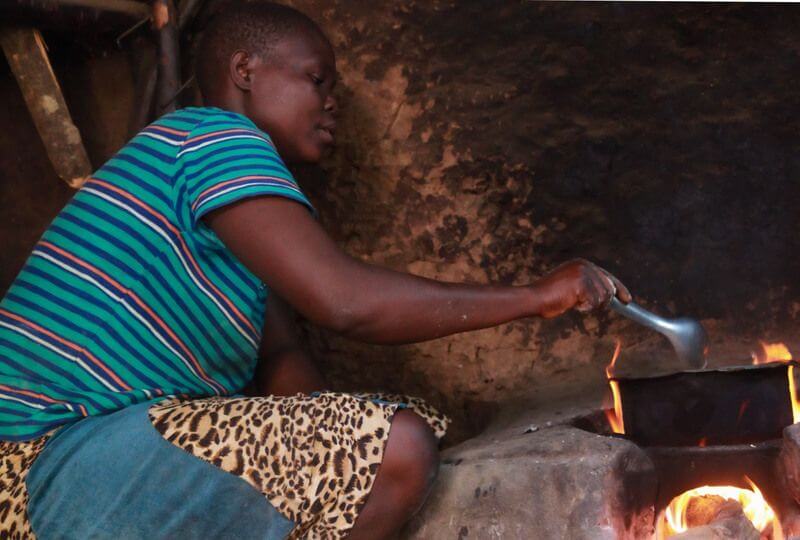For Brenda Luhombo, a resident of Ivakale village in Western Kenya, living close to Kakamega Forest meant unlimited access to firewood and charcoal. She could easily buy them from the illegal loggers who walked right past her door – to and from the forest.
But all that changed in 2019 when she finally installed an energy-saving stove.
“I used to spend 200 shillings (US$1.60) per day on firewood and 2,000 shillings (US$16) on charcoal every week, but since the stove installation in my kitchen, I spend only 100 shillings on firewood which lasts up to one week. The forest management sells us firewood from trees that have dried up,” said Luhombo.
Kakamega is Kenya’s only tropical rainforest, believed to be a remnant of the ancient Guineo-Congolian rainforest that once spanned the continent. The country has been battling to conserve the forest in the face of pressure from surrounding villages.
“The energy-saving stove is very efficient. When you cook in the morning, you will still find embers of flame to use for cooking in the evening. This is much better than the traditional cooking stones where I used to look for firewood daily and for every meal,” Luhombo added.
According to Global Forest Watch, from 2001 to 2021, Kakamega lost almost three thousand hectares, an 8.2% decrease in tree cover and equivalent to some 1.37 million tons in carbon dioxide emissions. High firewood and timber demand by neighbouring communities was primarily responsible.
Today, Luhombo is saving money and the forest. And it’s thanks to a cook stove project started by a local women’s group.
“Since this project started, the trips the locals used to make to the forest to get firewood have reduced. The stoves use less energy than the traditional three stones used for cooking. To a bigger percentage, we have reduced the degradation of the Kakamega forest,” said Berita Mideva, secretary of the Valonji Women Group.
Comprising 11 women and four men, Valonji Women Group has been producing and installing energy-saving stoves in communities around Kakamega Forest for over ten years.
“In 2010, we were approached by Eco2librium company, asking us to help in the conservation efforts to save the Kakamega Forest from extinction. This was because of the increased illegal wood harvesting and climate change,” Mideva explained.
Eco2librium is based in Kakamega town that develops and distributes cookstoves and renewable-energy products to reduce the demand for wood fuel from the forest.
Mideva says they were required to mould the energy-saving stoves as per the design given to them by Eco2librium, after which the company was to buy and install them within the community.
John Luseno, the senior manager at Eco2librium, says they started working on the energy-saving stoves project by establishing a system that could be adopted by the community and conserve the forest.
“We approached the women groups since women can easily go into other women’s kitchens to advertise the energy-saving jikos and install them,” said Luseno
“Eco2librium advanced us an interest-free loan of Ksh400,000 (US$3,200), which we used to build a warehouse for storing the stoves we make in readiness for sale. They then gave us another loan of Ksh200,000 (US$1,600), which we used to construct an energy-saving and modern kiln for firing the stoves,” added Mideva.
Mideva explained they buy a canter of clay at Ksh4000 (US$32) and produce at least 400 stoves after moulding.
When the stoves are ready, Eco2librium buys each at Ksh220 (US$1.76), which translates to a profit of around Ksh80,000 (US$636) per canter for the group.
“Besides saving the forest, our members have been empowered economically. With the money we get, we have taken our children to school up to the university and fend for our families,” said Mideva.
Besides Valonjii Women Group, the project works with 11 other women groups who produce and install stoves in surrounding regions.
“We buy the stoves from the women groups and take them to our office where we install unique codes that help us to track its movement up to the user level where our installers move around the households selling them at a subsidised price of Ksh160,” said Luseno
“Our installers are spread across the Western region where they offer free installation of the jikos as it’s a subsidy from a carbon fund. We want everyone to have the stoves and save the forest from degradation.”
For every stove installed, the installer receives Ksh280 (US$2.3).
As of December 31, 2022, 150,814 stoves had been installed in over 80,000 households in Kakamega, Vihiga, Bungoma, Busia, Nandi, Siaya and Kisumu counties.
Carbon funds place a financial value on carbon emissions, allowing companies wishing to offset their own emissions to buy carbon credits earned from sustainable projects, like Eco2librium.
Chris Amutabi, a natural resource management and conservation expert, who is also the Assistant Director, Research and Monitoring at Eco2librium, says the project has helped restore the Kakamega Forest as well as conserved threatened biodiversity.
“Kakamega forest is the home of 33 venomous species of snakes, locals lost lives due to snake bites, but after the project took effect, the cases are rare as no one is disturbing the snake’s peace. The forest has over 300 species of butterflies, and their haven has also been preserved,” he said.
Besides preserving biodiversity, Amutabi adds that “Last year alone, we planted 10,000 indigenous trees in the forest, primarily concentrated in the area where the clay for making energy cooking stoves is harvested.”
Eco2librium also produces briquettes from carbonised bagasse (activated carbon from sugarcane waste).
“We convert sugarcane bagasse into sustainable charcoal as an alternative fuel source to wood charcoal,” said Amutabi.
As a result of these initiatives, Eco2librium has been included in the ‘Best for the World’ list in 2017, 2018, 2020 and 2021 by B Lab, a global organisation that promotes the use of business as a force for good.
bird story agency





